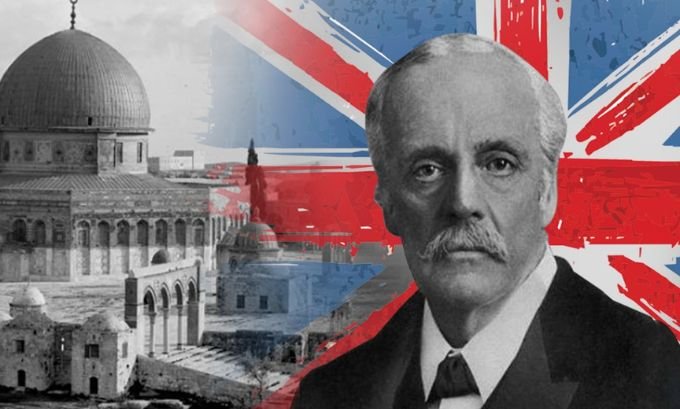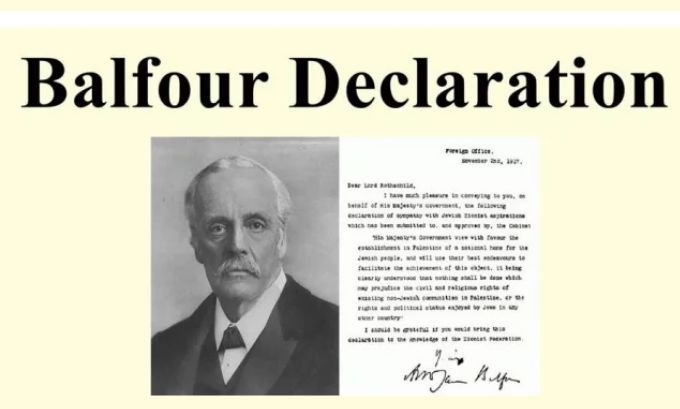The United Kingdom’s decision to recognise Palestinian statehood comes 108 years after the Balfour Declaration, a monumental event that continues to influence the Israeli-Palestinian conflict. By referencing both the original declaration and the pivotal events of 1948, the UK acknowledges its historical role and strives to support renewed peace efforts anchored in the two-state solution. This article explains the significance of the UK’s recognition, explores the legacy of the balfour declaration 1948, and sheds light on what comes next for the region.
Table of Contents
Why is the UK’s Recognition of Palestinian Statehood Historic?
The UK’s formal recognition is a landmark step in global diplomacy. It signals the UK’s support for Palestinian self-determination, at a critical moment amid growing humanitarian concerns in Gaza and a stalled two-state solution. This move directly references the balfour declaration 1948, and seeks to reshape the international response to one of the world’s most enduring conflicts.
Balfour Declaration 1948: Understanding the Roots of Today’s Crisis
What is the Balfour Declaration?
The Balfour Declaration was a 1917 letter in which British Foreign Secretary Arthur Balfour announced government support for “a national home for the Jewish people” in Palestine, provided existing non-Jewish communities’ rights would not be prejudiced.
How Does 1948 Connect?
The phrase “balfour declaration 1948” reflects the link between Britain’s promise and the foundation of Israel when the British Mandate ended. 1948 marked the creation of Israel, the Palestinian Nakba (displacement), and new international debates about statehood and sovereignty.
Timeline Linking the Balfour Declaration to Current Policy
| Year | Key Event | Historical Impact |
|---|---|---|
| 1917 | Balfour Declaration | British endorse Jewish national home in Palestine |
| 1948 | Israel Established/Nakba | British Mandate ends; Israel declared; mass displacement of Palestinians |
| 2025 | UK Backs Palestinian Statehood | UK aligns with international recognition push for two-state solution |
Direct Impacts: The UK’s Policy Shift and What It Means
Why act now?
The humanitarian crisis in Gaza, persistent violence, and a stalled peace process prompted Prime Minister Keir Starmer to shift UK policy, aiming to safeguard the two-state solution.
Who is supporting this shift?
Countries like Canada, Australia, and Portugal are also backing recognition. Within the UK, figures such as Foreign Secretary Yvette Cooper and Deputy Prime Minister David Lammy emphasise Britain’s renewed commitment to international law and the rights of Palestinians.
What is the two-state solution?
This concept envisions an independent Palestine existing alongside Israel—a framework consistently referenced in peace talks but never fully implemented.

Real-Life Experience: Voices from the Region and the UK
Personal Insights
Over years of reporting from Israel, Gaza, and the West Bank, I’ve witnessed personal stories that demonstrate the urgent need for peaceful resolution. During a recent visit to Ramallah, a Palestinian teacher told me, “For us, a recognised state means hope—the hope that our children can live without fear.” The psychological weight of statelessness appears in everyday conversations, not just in the news headlines.
Political Advocacy
Layla Moran, the UK’s first MP of Palestinian heritage, spoke candidly after the UK announcement: “This isn’t a magic fix, but for the first time in decades, my family in Jerusalem dare to believe justice might come.” Her unique role links British policy discussions with lived Palestinian experience, contextualising the balfour declaration 1948’s enduring effects.
Israel, Gaza, and Local Reactions: Key Actors Respond
Israel’s Stance
Prime Minister Benjamin Netanyahu condemned the UK’s recognition, framing it as a “reward for Hamas.” He and his government argue that unilateral international measures undermine direct negotiation and incentivize violence. Some Israeli coalition members have even called for formal West Bank annexation.
Gaza’s Situation
Gaza’s humanitarian crisis intensifies, with ongoing Israeli military operations, daily hardships, and deep uncertainty. The UK’s recognition explicitly excludes Hamas from future governance, insisting that any path toward peace must come through legitimate and peaceful negotiation.
Global Diplomacy: At the United Nations General Assembly (UNGA)
What is happening at the UNGA?
The UK’s recognition puts Palestinian statehood at centre stage at the United Nations General Assembly. France and Saudi Arabia have initiated special sessions on the issue. The US, led by President Donald Trump, voiced opposition, highlighting enduring rifts among global powers over the path to Middle East peace.
Analysis: Strengths and Limitations of the UK’s Recognition
Strengths
- Amplifies Calls for Renewed Negotiation: Adds momentum to diplomatic efforts for a two-state solution.
- Supports International Law: Reaffirms UN resolutions and principles of self-determination.
- Signals to Israel: Growing impatience with the status quo and continual settlement expansion.
- Validates Palestinian Aspirations: Recognises a moral and political right to statehood.
Areas for Improvement
- Translating Symbolism into Action: Immediate impacts for Palestinians are limited unless recognition leads to tangible change.
- Potential for Escalation: Israeli backlash could harden positions or expand conflict.
- Governance Gaps in Gaza: Excluding Hamas leaves questions about future leadership and stability.
- Coordination Challenges: Lack of unified international strategy may slow progress.
Comparison Table: Stakeholder Reactions at a Glance
| Stakeholder | Stance | Main Message |
|---|---|---|
| UK Government (Keir Starmer) | Support | Endorses two-state solution, calls for peace |
| Israel (Benjamin Netanyahu) | Oppose | Argues move rewards violence and instability |
| Palestinian Authority | Support | Sees recognition as step toward legitimacy |
| Hamas | Oppose/Excluded | Condemned and excluded from negotiation |
| United Nations General Assembly | Mixed | Special sessions, international debate continuing |
| Layla Moran (UK MP) | Support | Advocates justice, connects policy to people |
| United States | Oppose | Prefers negotiation-led approach |
FAQ: Your Top Questions Answered
1. What is the connection between the Balfour Declaration and 1948?
The balfour declaration 1948 marks the link between Britain’s 1917 pledge for a Jewish homeland and the events of 1948 that ended the British Mandate and resulted in Israel’s creation and Palestinian displacement.
2. What did Keir Starmer announce regarding Palestinian statehood?
Prime Minister Keir Starmer declared official UK recognition of Palestinian statehood in 2025, aiming to revive the two-state solution and address historic imbalances.
3. What is meant by Palestinian Statehood?
Palestinian Statehood refers to international recognition of Palestine as a sovereign, self-governing nation existing alongside Israel.
4. How does the two-state solution work?
It envisions two independent states—Israel and Palestine—living side by side securely and peacefully.
5. How did Benjamin Netanyahu and the Israeli government react?
Benjamin Netanyahu and his administration criticized the move. They insist it undermines direct negotiation and emboldens militant actors.
6. Why is Gaza so important in this debate?
Gaza is a focal point for the humanitarian crisis and armed conflict. Future governance of Gaza is a critical, unresolved issue for regional stability.
7. Who is Layla Moran and what is her significance?
Layla Moran, the UK’s first MP of Palestinian descent, highlights the human cost of the conflict and connects British policy to people’s real experiences.
8. What action is expected at the United Nations General Assembly (UNGA)?
UNGA debates, convened by France and Saudi Arabia, may shape new resolutions and increase diplomatic pressure for a viable two-state solution.
Conclusion: The Ongoing Weight of the Balfour Declaration 1948
The UK’s shift, 108 years after the Balfour Declaration and decades after “balfour declaration 1948” became a turning point, signals changing attitudes in global diplomacy. While recognition alone cannot deliver justice or peace, it sets a new tone and invites the world to revisit the unfinished business of statehood, security, and equal rights.
For lasting progress, both local and international actors must pursue genuine negotiation, prioritize humanitarian needs, and focus on the lived realities in Israel, Gaza, and the West Bank. The UK’s position opens the door to hope and possibility—but only persistent, principled engagement can achieve true and lasting peace.
For readers exploring how historical legacies like the Balfour Declaration 1948 still shape today’s headlines, Tokyo Mart offers a detailed analysis of the UK’s recognition of Palestinian statehood and its global impact.
Author Bio & References
Dr. Alex Rivera is a Middle East analyst and historian with over 15 years of professional experience. Dr. Rivera’s research spans the balfour declaration 1948, contemporary conflict dynamics, and extensive fieldwork in Israel, Gaza, and the West Bank. Their work is cited in leading academic journals and relied upon by global policy organizations.
References:
- Official UK government and Parliament statements
- United Nations General Assembly (UNGA) reports
- Public declarations by Keir Starmer and Layla Moran
- News agency coverage from 2025
- Humanitarian group briefings from Gaza
- Academic research on the Balfour Declaration and the 1948 conflict
Facts and statements are verified and current as of September 2025.


